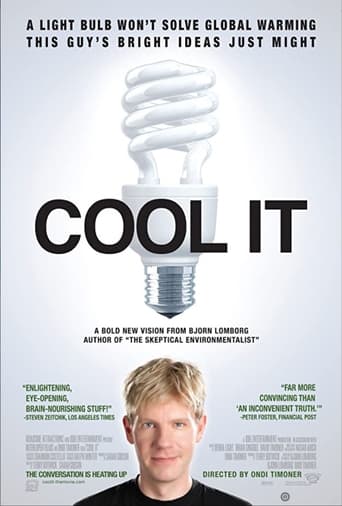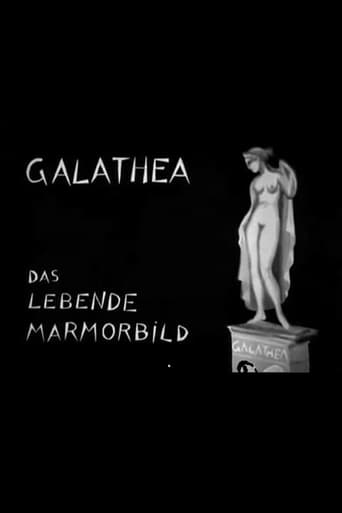

Cool It (2010)
A documentary that takes an alternative approach to dealing with the global warming crisis.
Watch Trailer
Cast
Similar titles


Reviews
Surprisingly incoherent and boring
The first must-see film of the year.
Strong acting helps the film overcome an uncertain premise and create characters that hold our attention absolutely.
Let me be very fair here, this is not the best movie in my opinion. But, this movie is fun, it has purpose and is very enjoyable to watch.
Whether or not you agree with the things you see in "Cool It", you need to have an open mind to even consider watching it in the first place--and that is an inherent difficulty with the film. In other words, if you are dogmatic in your views, you wouldn't bother watching a movie that casts many assumptions into question about your assumptions. So, provided you actually watch it and have a reasonably open mind, you'll no doubt enjoy it and feel challenged by Bjørn Lomborg's film about the environment."Cool It" is a film that was inspired by Lomborg's book "The Skeptical Environmentalist". In this textbook, Lomborg uses statistics to explore the various claims some environmentalists have made about a variety of topics--in other words, he tries to determine if the claims stack up to a critical analysis. The most notable, and the one covered in "Cool It" most, is about global warming, though the book (which I strongly recommend) covers many other topics such as the oceans, population density and the quality of our air.As I mentioned above, most of "Cool It" concerns Lomborg's assertion that the way that we deal with global warming is ineffective and wasteful. Now, despite his detractors saying that Lomborg denies global warming, he does not. He just thinks that current policy makes folks think highly of themselves and costs a lot of money but does no good--and there are a lot better ways would could direct our money and energies. And, it's not just Lomborg in this film but many other experts that state that the policies are ineffective and need to be OPENLY debated. Fortunately, they do not stop here--Lomborg and the rest suggest much more effective ways to spend our money and efforts that will either make a greater impact on the problem OR will address more serious problems, such as the serious lack of health care in developing nations.Because the film does not completely deny global warming, some folks will no doubt hate it. And, because the film has the nerve to say that there really is not a consensus that global warming is a HUGE threat, folks on the other side will no doubt hate it. However, considering that the arguments "An Inconvenient Truth" are mostly alarmist and emotional*, it's really nice to see someone back up and take a look at this and many other issues scientifically--with data and not emotion to bolster it.Overall, this is a very well-reasoned film that well states SOME of Lomborg's ideas in "The Skeptical Environmentalist". And, even if you don't agree with all or even much of it, it does make you THINK for yourself--something few films really try to do. Exceptional.*Among the most offensive things I saw in "Cool It" were some of the alarmist videos that show children dying, presumably, if you don't act NOW! Considering that many of these same folks also own carbon offset companies or are supported by companies that would benefit from such policies, it seems pretty gross to use such scare tactics. Just my two cents worth...
I saw this on cable, twice now. The first time it was on in the background while I was working and I found that I couldn't work; it was just too interesting. The second time I sought it out, set a reminder to ensure I didn't miss it, and set aside undisturbed time so I could pay attention and LEARN.Unlike most modern documentaries, which contain barely disguised sarcasm (think Michael Moore) rather than factual discussion, or which lecture without informing (think Al Gore) this film is a combination of facts (with references) and lectures with a common sense approach rather than Al Gore's "I know more than you do" doctrinal catechism.Starting with his own background and disfavor in the mainstream climate change community, the film agrees that climate change is a problem to address, but then moves through several climate change "remedies" which have been proposed, looks at the cost, and then uses the same amount of money to address the climate change issue as well as hunger, education and disease. Turn off the lights for an hour? It's a great feel good remedy but it doesn't do a thing to help the planet, and lighting a candle is actually worse. Buy a hybrid? It has almost no impact.The gist of the global warming debate, we learn, is fear. And taking on Al Gore point by point we learn that our fear is misplaced. Hurricanes cause more severe damage nowadays, but there's more people living at the beach and more high rise buildings to be damaged too. Was New Orleans flooded because of a global warming induced Hurricane Katrina, or because a levee was poorly designed? Moving on to solutions, we learn about alternative energies, alternative strategies, and more, and finally the final cost for all these strategies is so low that other world issues like hunger and disease are easily paid for with the same investment that Al Gore would ram down our otherwise-frightened throats.Before you pay a "carbon tax," and buy a Prius, see this movie. And don't be afraid anymore.
Bjørn Lomborg is an environmentalist and an economist. He accepts without reservation that global warming is occurring and that it is caused by human activity, but he makes a critical examination of the methods by which we're attempting to deal with the problem. In other words, he disagrees with those who would say that climate change is not a real and serious problem, but he is skeptical of the primary strategies to combat the problem which have been advanced by mainstream environmentalists.He's become controversial because he's asking questions of fellow environmentalists which they would rather not have to answer. Are climate change activists engaging in alarmist scare tactics and exaggerating the dangers involved in an attempt to motivate through fear? If we wish to invest in attempts to improve the lives of those who are most disadvantaged, what is the relative benefit of spending on climate compared to other humanitarian endeavors?Are attempts to artificially raise the price of fossil fuels likely to be successful at lowering temperatures? Will they be sufficiently effective to justify the costs in terms of slowed economic growth and lost increases in the standard of living? Lomborg seems to believe that the most reasonable approach is a combination of:>engage in many relatively unobtrusive small scale activities to combat global warming in the short term while contributing more to efforts to promote global health and education >employ geo-engineering and adaptation in the medium term to minimize the disruption of temperature increases >make large immediate increases in funding for research and development of renewable energy and more sophisticated nuclear reactors so that in the long term alternative energy will not be more costly than fossil fuelsHis arguments about what the rational approach (lacking the unreflective dogmatism of both the deniers and the alarmists) is to finding the best future for the global population certainly merit the time it takes to view this film.
After reading the first 3 reviews I decided that a review from someone who has read Bjorn Lonborg - who is an economist (not "a poly-sci guy" as one newspaper reviewer referred to him) - and who has studied the science of global climate change for more than a decade might be helpful.First off, Lonborg is not a GW skeptic: he thinks it is real, but that the severity has often been greatly overstated, which even the scientists at IPCC will admit. Also, he does not mean that if we spend a few trillion dollars and deprive (by creating large deficits of energy) poor people all over the world of the few things they currently get to enjoy (like adequate food) we will decrease global temperature by 1 degree: he means we will limit the increase by one degree. Big difference. He is pointing out that taking a sledge hammer to the world economy will not really make much difference in temperature, but a big difference to people who will not be able to buy energy at the intentionally increased prices.Lonborg points out that we will be able to adapt to the climate change, as people and animals have been doing throughout history, as we gradually change from fossil fuels as more desirable technologies mature. Some parts of the world - equatorial zones - may change drastically, but those nearer the poles (Minnesota, Canada) will likely gain a longer growing season and more tillable land. But, Lonborg's main point is that if we spent these large sums of money and resources on things we can change: hunger, diseases like malaria and AIDS, and clean water, we could bring about some real improvement in the lives of millions of people world-wide.My studies, which include a discussion with one of the leading scientists at IPCC, lead me to think that Lonborg makes a very good case. I don't know why so many reviewers ridicule Lonborg. This movie, if you really watch and listen, does not deny climate change. It does state that global poverty is not the best way to counteract global climate change.










